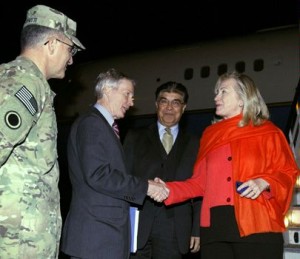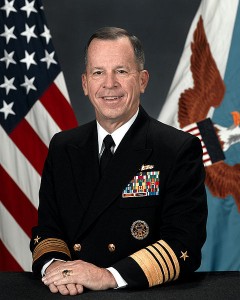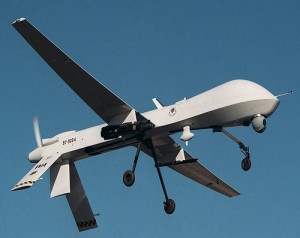Clinton, Petraeus Head to Pakistan for Talks While NATO Attacks Near Border

Secretary of State Hillary Clinton shakes hands with Ambassador to Afghanistan Ryan Crocker on arrival in Kabul on Wednesday. (State Department photo)
Secretary of State Hillary Clinton and CIA Director David Petraeus will be in Islamabad today for talks amid somewhat calmer US-Pakistan relations and to set the stage for a possible negotiated end to hostilities in Afghanistan. At the same time, NATO has been conducting raids for about a week on the Afghanistan side of the border with Pakistan, attempting to rid the area of members of the Haqqani network.
The previously escalated rhetorical battle between the US and Pakistan has been on a calming trajectory since reaching its highpoint when Joint Chiefs Chair Mullen claimed that the Haqqani network was a virtual arm of Pakistan’s ISI. Amid these calming relations, Clinton arrives in Islamabad today after a visit to Kabul.
The visit to Afghanistan was aimed in part at boosting Afghanistan’s efforts to negotiate a settlement with the Taliban ahead of the US withdrawal from Afghanistan. Those negotiations were dealt a severe setback when Burhanuddin Rabbani, the chief negotiator for Afghanistan, was killed last month by a suicide bomber. As the Washington Post points out, the US and Afghanistan have not always agreed on how to proceed in the negotiations:
Clinton, who traveled to Kabul after visits to Libya and Oman, was scheduled to meet Thursday with President Hamid Karzai and other government and parliamentary leaders. Her trip comes at a time of increased tensions between U.S. and Afghan officials over how to pursue peace with the radical Islamist Taliban movement after a decade-long insurgency.
/snip/
U.S. officials are pushing for a negotiated settlement with the Taliban as a crucial step toward ending the conflict and have engaged in secret parallel talks with Taliban leaders, so far without success.
Karzai, who has criticized the secret U.S. talks, has urged a greater role for Pakistan in the reconciliation process, noting that many of the key Taliban commanders use Pakistan’s lawless tribal region as a base. The State Department official, who spoke on the condition of anonymity to discuss sensitive diplomatic matters, said Clinton “agrees with President Karzai that Pakistani cooperation is critical.”
Note that while differing on their approaches to negotiating with the Taliban, both Afghanistan and the US agree that Pakistan must do more to control militants, especially the Haqqani network. However, the accusations of providing safe havens for the Haqqanis now seem to flow both directions: Read more →



